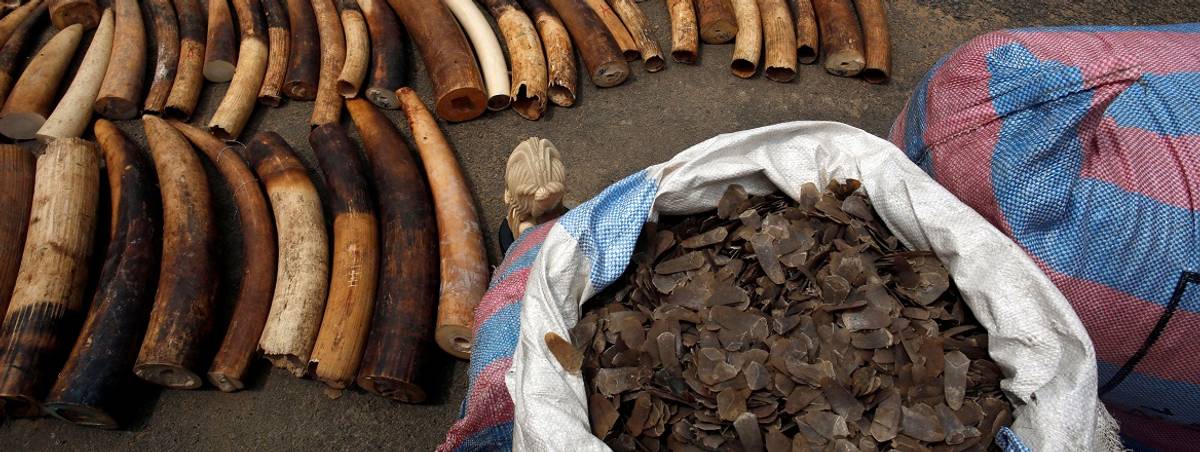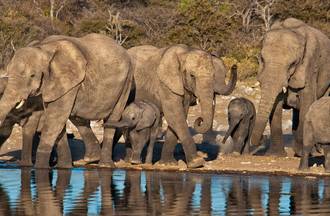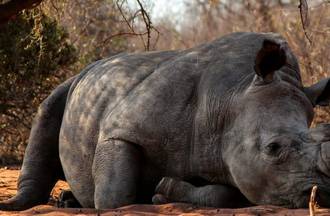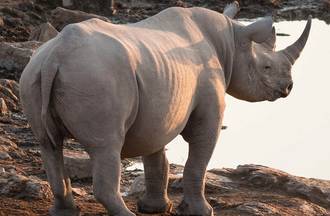Combatting the Illegal Wildlife Trade in West and Central Africa: Phase II
This project aims to increase our understanding of wildlife-related illicit financial flows and strengthen public sector capacity and private sector engagement in West and Central Africa.
This project advances the ‘follow the money’ approach and expands on RUSI’s initial research into anti-money laundering and financial crime responses to the illegal wildlife trade (IWT) in West and Central Africa conducted in 2020 and 2021.
Since 2015, West and Central Africa has emerged as the largest source and transit hub for forest elephant ivory, pangolin scales and African rosewood, all part of the global illegal wildlife trade (IWT). Nigeria has become the top global export point for elephant ivory and pangolin scales. Significant volumes of the illegally exports from West Africa are sourced from neighbouring biodiversity hotspots in Central Africa, particularly Cameroon, Gabon, the Republic of Congo, the Democratic Republic of Congo and the Central African Republic.
Recognising the global urgency of the threat, in 2020, the Financial Action Task Force (FATF) called on all countries to assess their exposure to IWT; to ensure legal powers exist to charge offenders; and to undertake greater numbers of parallel financial investigations in IWT cases. Having pioneered the use of a financial approach to understanding and combatting wildlife crime in East Africa and Southern Africa, in 2021–21 RUSI conducted a strategic evaluation of West Africa’s progress against the FATF recommendations, in partnership with the Inter-Governmental Action Group Against Money Laundering in West Africa and supported by the German Agency for International Cooperation’s (GIZ) ‘Partnership against Poaching and Illegal Wildlife Trade’ programme.
As West and Central Africa are represented by different FATF-style regional bodies and governed by different regional policies and frameworks, they need to be handled as two distinct regions. Furthermore, our research report, published in 2021, showed that West African financial investigation units (FIUs) identified the need for greater training, knowledge and financial resources to pursue IWT cases as a predicate offence for money laundering.
In collaboration with regional stakeholders and civil society experts, this project will improve the effectiveness of anti-money laundering and financial crime responses to IWT in West and Central Africa by encouraging the use of innovative financial approaches in wildlife crime investigations, increasing inter-agency and cross-sector cooperation, and ensuring that the adoption of this approach becomes commonplace.
The project started in 2022 and will conclude by the middle of the decade.
Project team
Cathy Haenlein
Director of Organised Crime and Policing Studies
Organised Crime and Policing
Anne-Marie Weeden
RUSI Senior Associate Fellow, OCP | SHOC Network Member
Jennifer Scotland
Research Analyst
Organised Crime and Policing
Elijah Glantz
Research Fellow
Organised Crime and Policing
Alastair Greig
Research Analyst
Organised Crime and Policing
Tom Keatinge
Director, CFS
Centre for Finance and Security
Aims and objectives
To improve knowledge of and capacity to disrupt the illicit financial flows that make IWT in West and Central Africa profitable. This will be achieved in two ways: mainstreaming innovative financial approaches in wildlife crime investigations and increasing inter-agency and cross-sector cooperation. Our approach will be locally adapted and build on experience from other successful illicit finance and IWT projects conducted by RUSI in West, East and Southern Africa.
Related programme of work
Funding
GIZ’s ‘Partnership against Wildlife Crime in Africa and Asia’
Funding for this project is provided through the global project ‘Partnership against Wildlife Crime in Africa and Asia’, implemented by GIZ on behalf of the German Federal Ministry for Economic Cooperation and Development and the German Federal Ministry for the Environment, Nature Conservation, Nuclear Safety and Consumer Protection.
Find out more
Project outputs
RUSI will support and produce the following:
- The establishment of a West Africa Chapter of the United for Wildlife Financial and Transport Taskforces, a network of private, public and third-sector partners working individually and cooperatively to reveal, disrupt and prevent IWT.
The Chapter was successfully launched in July 2024 in Lagos, Nigeria, with a broad range of stakeholders from the finance and transport sectors, as well as law enforcement, government and civil society in attendance.
An enhancement of the institutional capabilities of the Nigerian FIU, the Economic and Financial Crimes Commission, and other relevant authorities in combatting wildlife-related illicit financial flows, as well as overcoming obstacles to effective cooperation and collaboration in financial investigations and prosecutions.
This project has facilitated a multi-agency capacity-building training in the financial investigation of IWT, co-hosted by RUSI and the Nigerian FIU and delivered with assistance from technical experts at the Environmental Investigation Agency. The themes and discussions from this workshop are documented in this RUSI Conference Report.- The delivery of an in-depth strategic assessment of regional and national capacity to address wildlife-linked illicit financial flows in Central Africa via a publicly available report in French and English.
To date, the project has conducted data collection via a literature review, expert interviews, and a survey of the relevant FIUs, and aims to publish its analysis in a RUSI Occasional Paper in 2025.
- High-level engagement with regional FIUs and GABAC on policy and technical recommendations arising from the Central Africa research study.
In September 2024, two members of the project team were invited to present findings at the Deuxième Commission Technique Annuelle du GABAC à Libreville, and are participating in follow-up engagements to further support policy integration of RUSI’s research findings.












